Unforgotten series 3 writer: “we live in uncompassionate times”
Ahead of Unforgotten's series 3 finale, we interviewed writer Chris Lang about compassion, victimhood, and holding up a mirror to society…
Warning: Unforgotten series one and two spoilers.
After graduating from RADA in 1983, Chris Lang was in the familiarly vexing situation of any young actor waiting around to be given work. He picked up a handful of TV credits, appearing in British comedies including Drop The Dead Donkey and vehicles for Paul Merton, Harry Enfield and Jo Brand. Behind the scenes though, Lang started writing.
Screenwriting, initially on comedies, then on dramas Soldier, Soldier, Casualty and The Bill, and later producing his own miniseries Torn, Undeniable and A Mother’s Son, proved more reliable for Lang. He could write daily without having to wait for roles, working on new and established series as well as getting his original ideas down.
One such idea became ITV’s Unforgotten, which concludes its third series next week. Unforgotten is a ratings success and widely beloved. (Russell T. Davies is just one of its high-profile fans.)
The police drama stars Nicola Walker and Sanjeev Bhaskar as detectives investigating decades-old cold cases. Each series welcomes an ensemble cast of suspects whose pasts are painfully dug up over the course of six episodes as DCI Cassie Stuart, DS Sunny Khan and co. attempt to bring answers and closure to the victim’s family.
I spoke to Chris Lang about Unforgotten’s approach to crime drama, its emotional slant and the perspective it offers on the world of today.
What I love about Unforgotten is its compassion. Cassie gave a speech in series two about why we always need to try to understand people’s actions, even when they’ve committed heinous crimes. That seemed to be a mission statement for the show’s whole approach to crime drama?
Yes. I think we live in fairly uncompassionate times. We seem to live in a world where judgement is made on people who have failed and have done wrong and there seems to be very little capacity for saying ‘okay, you deserve to be punished. If you’re a danger to society, society needs to be protected from that but ultimately our goal must surely to be to try and find forgiveness and sometimes redemption’. We need to unlock that ideal. We just want to punish and to judge and release a lot of anger towards people. That speech by Cassie is sort of arbitrating some thoughts that I’ve been having for the last few years about where we are as a society.
Are you at pains in Unforgotten to present the police—in particular Cassie and Sunny—as good people doing the best they can in a very difficult job? Not showing corruption or officers who are only in it for careerism and ambition, but simply good, hard-working coppers?
There is a desire to show that side of the police—a side that exists, obviously in real life. The police are fallible as are we all and there are fuck-ups, but also we might have lost sight of what an extraordinary job it is that they do. You get reminded of it sometimes in instances like the Westminster Bridge terrorist attack when a police constable, an ordinary basic copper, attempted to—I think successfully—disarm one of the terrorists who had a knife and was trying to injure people. It’s very easy to forget that police officers do that on a daily basis, they run towards danger.
I don’t mean to suggest that the police are always beyond reproach or act in strict probity—of course they are a fallible institution but it’s easy to forget that most of them are doing really good work in a really difficult job, and perhaps we’ve lost sight of that. I think it’s really important to strike a balance. This show is not about pointing out the flaws of policing, although there are times when I do that. It’s more about showing what I believe to be the reality of police officers working today, which is people doing an extraordinarily hard job. They’re fallible, there is corruption, but that’s far from the whole story. It’s a companion piece to other series showing the darker side of the police. They all go hand in hand.
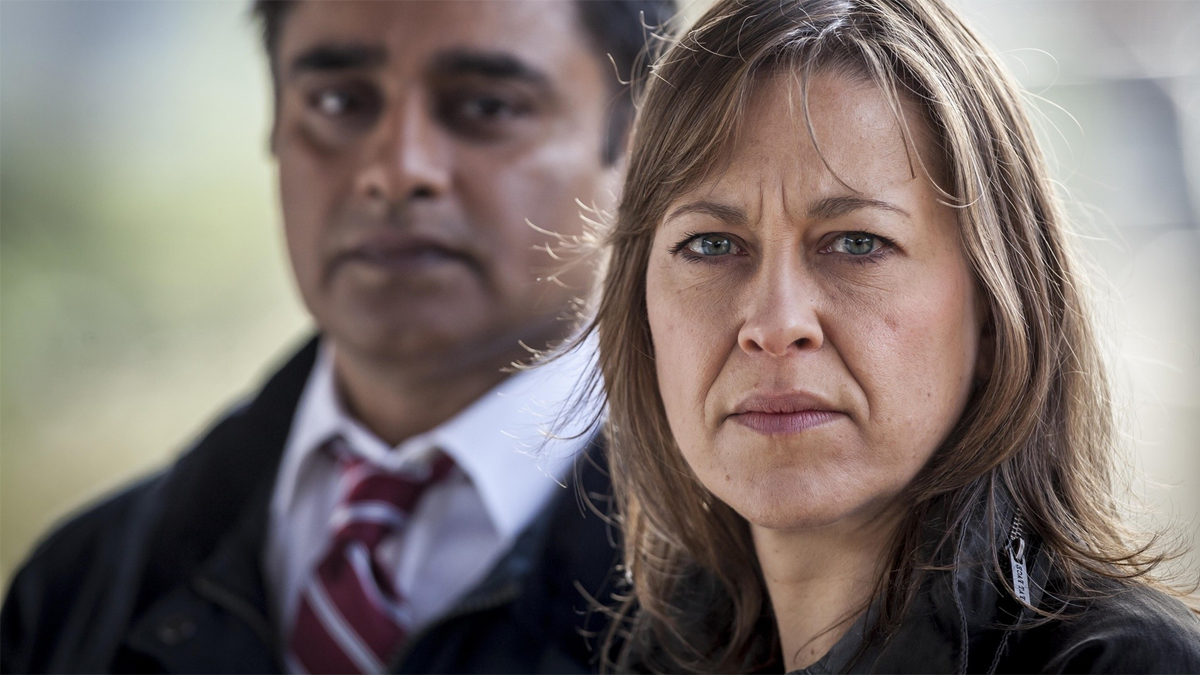
At the end of every series of Unforgotten, viewers can expect that the mystery will be solved and we’ll know the answers. Would you characterise it as what [Line Of Duty creator] Jed Mercurio calls “the drama of reassurance”?
Well, why does anyone watch drama, or why do we want to engage with any kind of storytelling? It’s because they offer a shape to lives that are often shapeless. Most things don’t get solved, change doesn’t always occur in people’s lives, so drama is a way of achieving that. Definitely crime drama—which is why it’s so successful—has a very clear shape, it has very clear moral parameters, it has a beginning, a middle and an end and there is resolution. I offer up resolution and I think that’s why people engage with the show. It has a very clear proposition, Unforgotten, and that’s why people engage with it in the way that they do.
In terms of what the viewers have come to expect from that proposition, how far do you try with each new series to both fulfil and subvert those expectations?
We have an expression where we say that each series is “the same but different”. We want to absolutely give the audience what they like and what they’ve clearly responded to, which is actually four dramas—if you take the antagonist stories, you’ve got four dramas in one and each of those stories could have their own series. I struggle always to contain their stories within the six episodes—and then you’ve got the story of the investigation as well.
I absolutely want to give the audience that but the difference in each series comes from the themes explored. It’s a really successful structure for allowing me to explore where we are in the UK at the moment. I believe that each series does that, it holds up a mirror and has a look at where we are. I don’t think it offers any particular answers or perspectives I just think it holds the mirror up and allows the audience to evaluate and to discuss it hopefully, when the show finishes. That’s really what we want people to engage with, to say ‘I agreed with that’ and ‘I didn’t agree with that’ and have a discussion about it.
Certainly this series, maybe more than the others is a real reflection of where we are as a society in terms of anger and rage and social media and what part they’re playing in it.
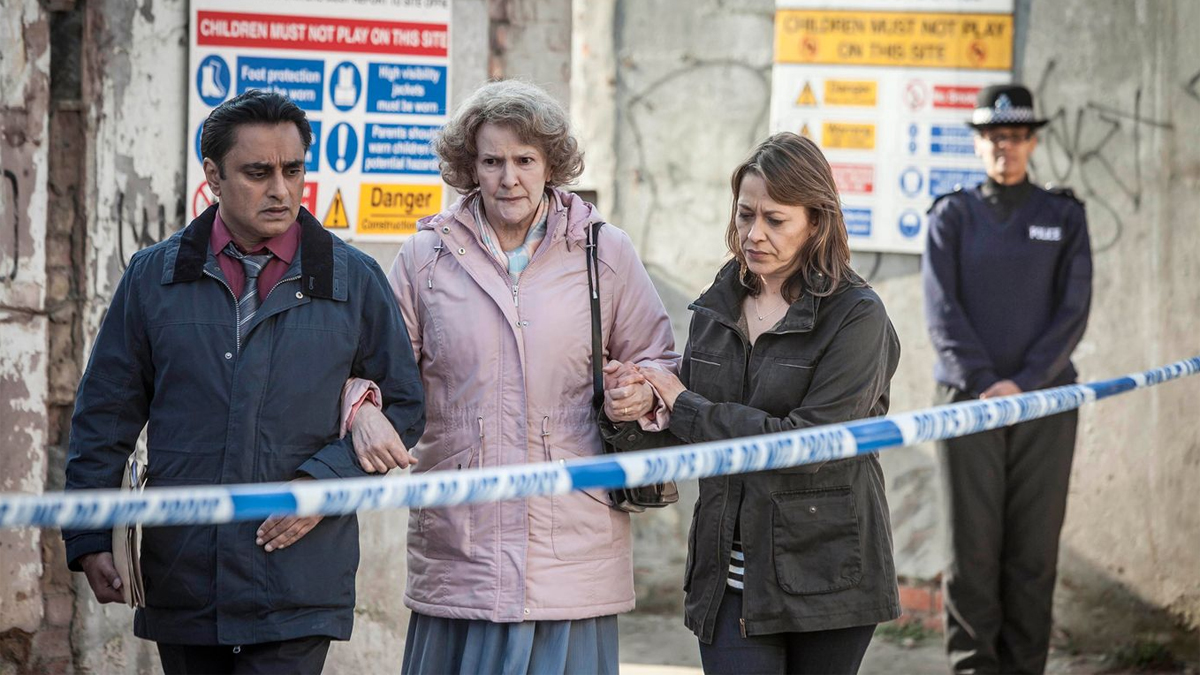
A character like Tim Finch [played by Alex Jennings], for example—he’s the kind of person you’d get to sign the back of your passport photo, a pillar of the community…
Absolutely.
And you’re showing the cruelty beneath that, which feels very relevant to all the people shored up by status that we’ve seen exposed in the public eye over the last few years. I suppose that’s what you mean by reflecting where we are currently in the UK?
That is a common theme of Unforgotten, people who seem to be one thing and then you expose them slowly over a number of episodes and reveal that they’re something else. That would be fairly consistent with the genesis of the series, which was looking at Stuart Hall’s case and seeing the slow dismantling over a period of months of public perception of who he was as each accusation of each horrific crime he committed came to light. All of the characters share that quality, that you’re going to peel stuff away, you’re going to reveal stuff underneath.
The characters are exaggerations, they’re extensions of people that I know who have done things in their past—nothing to compare with something of the scale in Unforgotten!—but everyone’s got secrets or things that they would be ashamed for other people to know.
With that, it’s the question of how much you can ever really know someone? That’s the unifying theme or ethos of the whole show—even those closest to you, can you ever really know them? There have been some astonishing cases recently where people thought they knew someone and they were revealed to be someone completely other.
The two characters in Unforgotten that as a fan, I hope won’t ever be revealed to be completely other than they seem, are Cassie and Sunny.
Oh yes.
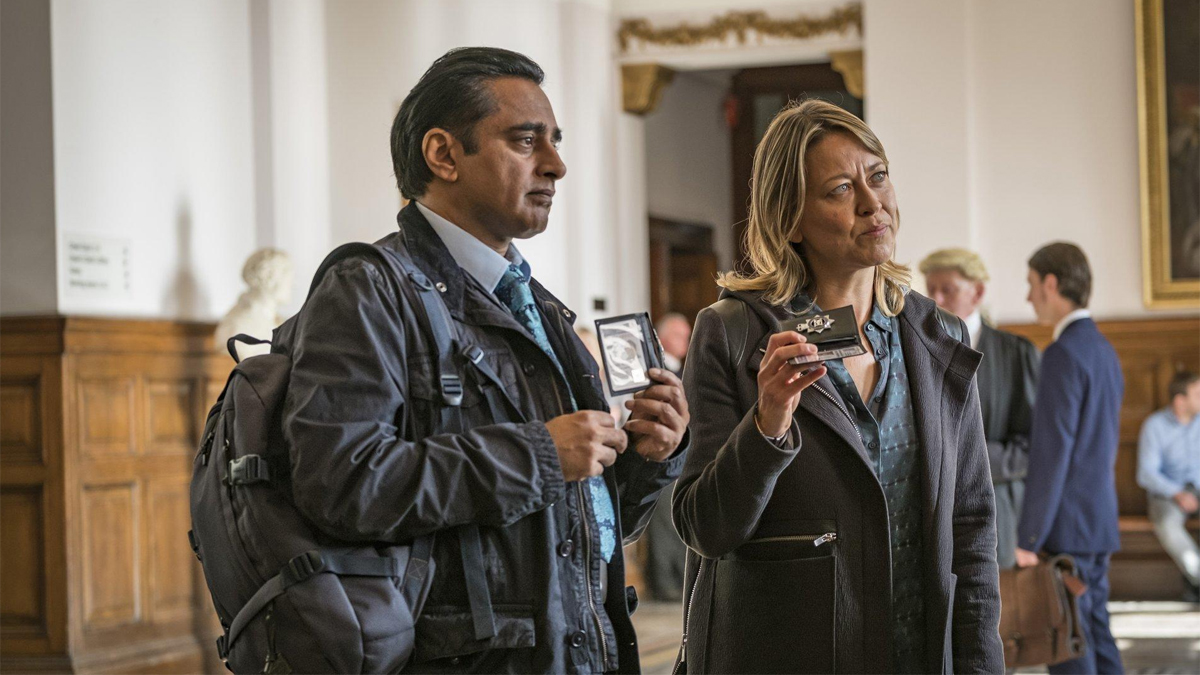
Unlike other police officers on TV, their damage isn’t the focus is it? They’re such a world away from that genre of TV cops who always seem to be standing heroically on rooftops in the rain. Cassie and Sunny are more likely to be seen dishing up a shepherd’s pie…
[Laughs] They are, they’re very human characters and I hope they’re a very genuine representation of what it is to be a police officer and the toll that takes. This series, we’re beginning to get a sense of the toll that it’s taken on Cassie and that will play out in episode six.
I read quite few books about what it’s like to be a fairly senior detective in the Met for twenty-five, thirty years, what it does to a person. Every single day of your working life, you’re seeing people at their very worst, people who have done the very worst things to other human beings, and quite often to the last people they should do damage to—their children or their wives or husbands. That takes an emotional toll. What’s not often talked about is the psychological damage done to long-serving police officers through the bodies they see on a weekly or monthly basis and the blood and broken families and hatred and anger and murderous rage that they have to process and look at week after week, month after month. I wanted to try and explore some of that with Cassie’s character, that of a very ordinary, very lovely uncomplicated person who is struggling to deal with some of the horrors that she’s having to engage with.
On the subject of genuine representation, in an under-resourced police service that’s increasingly target and clearance rate-led, though the end of series two for Cassie and Sunny was a moral high point, professionally it would have been a disaster. Having conducted that whole investigation into David Walker’s murder and not delivering a culprit would have been really bad for them. Is that perhaps the less realistic aspect of their characters?
You have to concede that this is a drama, not a documentary. There’s a difference between facts and truth. Although the facts might not always be one hundred per cent accurate in the sense of ‘Could they actually afford to spend that amount of time on a historical case?’ factually, maybe not, but what’s more important is the truth that we hopefully reveal through the drama.
The factual element, whether they would have the budget, or whether they’re all wearing exactly the right uniform or whether they’d use exactly that language, that’s something I’m not massively interested in. Some writers are and they get off on that and they love all of that. I don’t think it particularly enhances the real goal of drama, by which I mean uncovering what it is to be human, what it means to be us and looking at the way we live our lives. That’s more important to me.
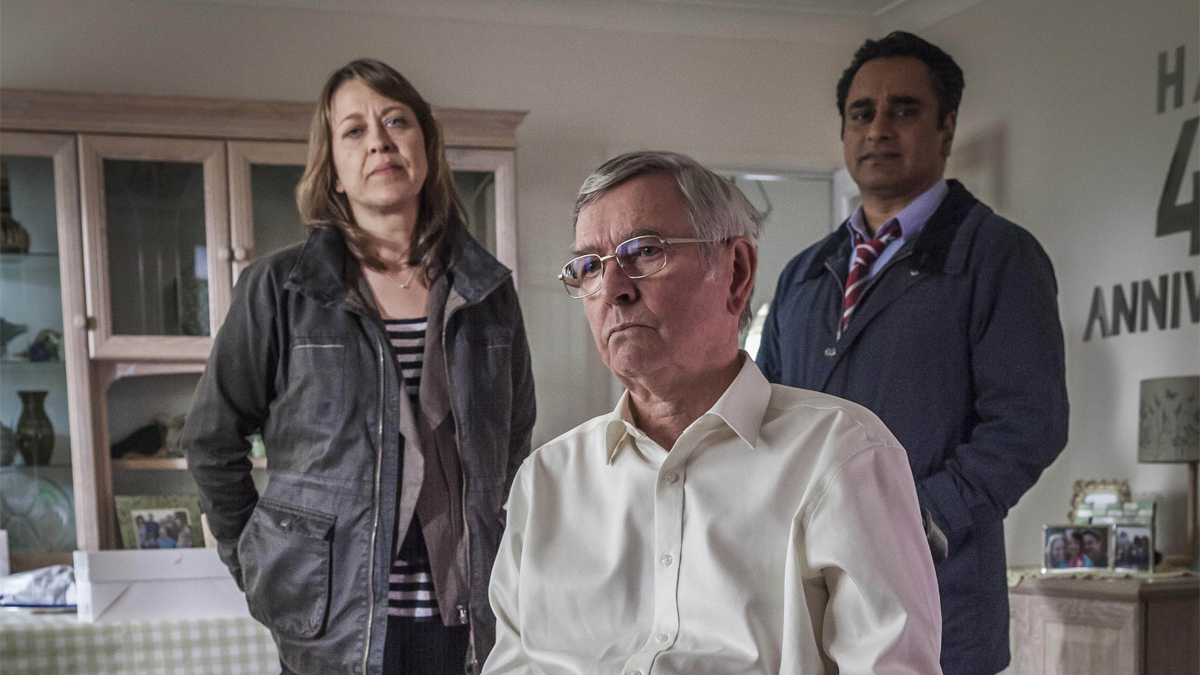
Going back to Cassie having experienced awful things in her career, Unforgotten doesn’t treat corpses as props to disgust the audience. The only time I’ve felt a little bit queasy watching Unforgotten was the very well preserved corpse of David Walker in the suitcase. I wondered if that slight goriness was allowed because of who he turned out to be?
You could argue that. I definitely wanted to play with people’s preconceptions, but I also wanted to explore that idea we were talking about at the beginning of the conversation about compassion. When we present a victim in drama, there is a set of reactions to that. It’s a well-trodden path, how we should feel about our victims. I wanted to fuck about with that. I wanted to present him as a victim, so we feel sorry for him, and then slowly reveal that actually, although he was a victim, he was also a pretty evil man himself.
How do we then feel about him? He was still murdered, and he left behind a grieving wife and a distraught son. Does that somehow compromise our ability to feel anger for what he did? There are lots of complex emotions going on in that story. The truth is, he was a victim of murder, he was a man who did some terrible crimes himself and yet he was probably also the victim of terrible crimes when he was young. It’s about challenging your preconceptions of how you feel.
I was having this conversation only this morning with my kids, we were driving somewhere and we were talking about an American rapper who’d just been murdered recently called XXXTentacion. He was a young guy, twenty years old, and he was well known for his incredibly violent lyrics and we were saying that almost inevitably, almost certainly he was the victim of violence as a young man, as a young boy. Now, what do we see that person as? He was a very violent man, he needs to be punished, society needs to be protected from him, but he was also a victim, he was a young lad who had his innocence stolen from him through violence.
That’s a long-winded answer to ‘why did we make the body in the suitcase so gory?’ but that’s what I’m trying to do with that character. In terms of how I tell a story, I’m always looking for interesting ways to make it difficult. And on a more practical level, to make it difficult to identify who the person is. In that instance, it was quite an exotic example of how a body can be preserved for twenty years. We didn’t dwell on it, hopefully it wasn’t salacious. There are a number of reasons why you choose to portray the dead bodies in the way that you do.
With the discovery of the bodies always comes the discovery of the first clue. The symbolic item – the car key, the watch, the titanium surgical plate. Do you have a lot of options for those when you’re writing?
No, they’re really difficult. They’re really difficult to come up with. If we go to a fourth series, I’ve got another idea which will take it to a very different place. I feel slightly that I’m going on the seat of my pants every time I find another way of identifying the body. It’s really hard to identify someone after twenty or thirty years. I haven’t got hundreds of those just sitting at home in a file marked ‘identifying factors’.
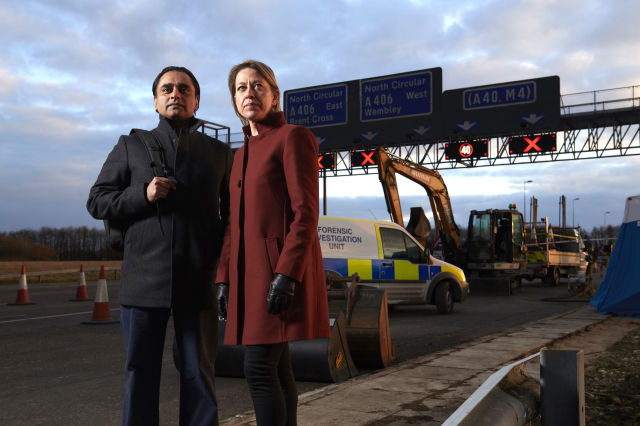
You’ve said you have half a dozen possible stories you could tell with Unforgotten?
Yes.
Do the stories start with the victim, or the decade of the murder, or the ensemble of suspects? Which is your way in?
It’s not an exact science. I’ve always described the process as a Darwinian one rather than a creationist one. The story evolves, the themes evolve, the characters evolve and they’re the product of coming up with a territory or the seed of an idea that you quite like and then just starting to throw loads of mud at the wall and see what sticks in terms of character and then more complex things in terms of structure.
Series three had an autobiographical starting point didn’t it? You actually went on a New Year break with a group of old schoolfriends? Was that the first seed of this story?
Yes, I’d gone on this weekend away with some mates twenty years ago for the millennium and it was a bit of a disaster. I always thought, what it would be like in a bunch of mates, if one of them turned out to be a murderer? What would it do to the friendship group? What would it make you question about yourself and how you could have put a stop to it and what it would reflect back on you. What might you do to protect them, what might you have done in the past unwittingly to have obscured their crimes? All of those questions were really interesting. It was wonderful as a starting point, a group of four friends who knew each other incredibly well being put under the cosh.
Tell me about the use of flashbacks in the show. Those little bursts of montage, you know that these days viewers are going to pause and screengrab them. Are there clues to find in them or is it more expressionist and symbolic?
Exactly, the latter. They’re extremely elliptical and deliberately so, because obviously I’m aware that people will pause to look at it and if there was anything revealed in them, then it wouldn’t stay in. They’re elliptical, they’re fragments, just fragments of memories all of which could be implicatory or could be quite innocent. The truth is most of the characters have got secrets, so they refer to their secrets rather than particularly the crime.
As the executive producer, you must also sign off on things like the opening credits. How many clues do you leave in there? I remember always being struck by the pan of peas on the boil in the series one credits and thinking, where does that fit in?
[Laughs] I think the pan of peas was one of mine, I said ‘let’s have it because it’s so fucking weird and odd’. I had Trevor Eve’s character saying “Are we having peas with that?” because it was just trying to root his character in his working class roots. He’d married a very wealthy woman and was moving in the higher echelons but at heart, he’d come from the East End of London and he still wanted peas with his roast.
We’ve got a brilliant titles guy called Peter Anderson who has done the titles from the beginning. He uses some images that are already in the drama but he gets the scripts before we start shooting and then he takes out things that he thinks are key little signifiers, and I do a list as well of things. I love the way he draws images together. He comes along and shoots stuff of his own. He got an excellent shot of the suspension bridge in Bristol and that’s the closing image of the titles this year, the car going over the suspension bridge, which obviously we were shooting at the time for all of the character of Chris’ stuff and his camper van.
Nicola Walker, I maintain, is the best pauser in the business. Do you write her pauses in as Cassie, or is that her own spin on the lines?
[Laughs] Some of them I write in, some of them are just her! That’s her style. I love it, I love her.
Our time’s up, so to finish, what can people expect from the series three finale?
A lot of surprises. A lot of things that I think they won’t be expecting, I hope. That’s what I want to do. I want to surprise them and I want to make them think. I can think of at least three big twists, three big turning points that people will hopefully have found difficult to see coming. So yeah, there’s a lot coming!
Chris Lang, thank you very much!
Unforgotten series three concludes at 9pm on Sunday the 19th of August.
